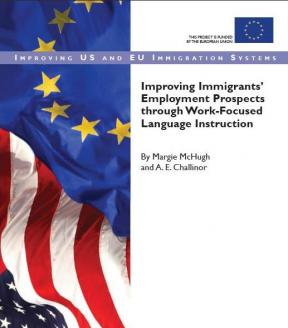Improving Immigrants' Employment Prospects through Work-Focused Language Instruction
This policy brief outlines a series of promising approaches to link language instruction with occupational training and to address the pressures and challenging life circumstances immigrants face.
This policy brief describes the range of policies available to improve immigrants’ economic integration through language acquisition, especially those focused on getting immigrants into jobs or moving into higher-paying jobs. It assesses promising models and practices from the European Union and North America, and provides recommendations for policymakers designing accessible, cost-effective, and tailored language programs.
Noting the failure of "umbrella language courses" to give immigrants "a tangible boost in the labor market," this policy brief outlines a series of promising approaches from both the American and European contexts to link language instruction with occupational training and to address the pressures and challenging life circumstances facing immigrants. Among these approaches are: contextualizing language training for workplace use; combining language and skills training based on the model pioneered by Washington State's I-BEST program; developing formal partnerships between employers and training providers, including worksite instruction models; and accommodating the needs of non-traditional students by offering evening and weekend classes, self-study options through greater use of technology, and child care assistance.
This resource is brief and concise, the points are succinctly made and clearly stated. It is also very solid: the research base for descriptive and experimental studies is robust and supports the recommendations, which are clearly articulated. It is an easy to understand resource and has appeal to a wide audience of readers, such as program planners, one-stop centers, and the State Department of Education, as they plan policy for programs to prepare immigrants to transition into the workplace.
This site includes links to information created by other public and private organizations. These links are provided for the user’s convenience. The U.S. Department of Education does not control or guarantee the accuracy, relevance, timeliness, or completeness of this non-ED information. The inclusion of these links is not intended to reflect their importance, nor is it intended to endorse views expressed, or products or services offered, on these non-ED sites.
Please note that privacy policies on non-ED sites may differ from ED’s privacy policy. When you visit lincs.ed.gov, no personal information is collected unless you choose to provide that information to us. We do not give, share, sell, or transfer any personal information to a third party. We recommend that you read the privacy policy of non-ED websites that you visit. We invite you to read our privacy policy.
